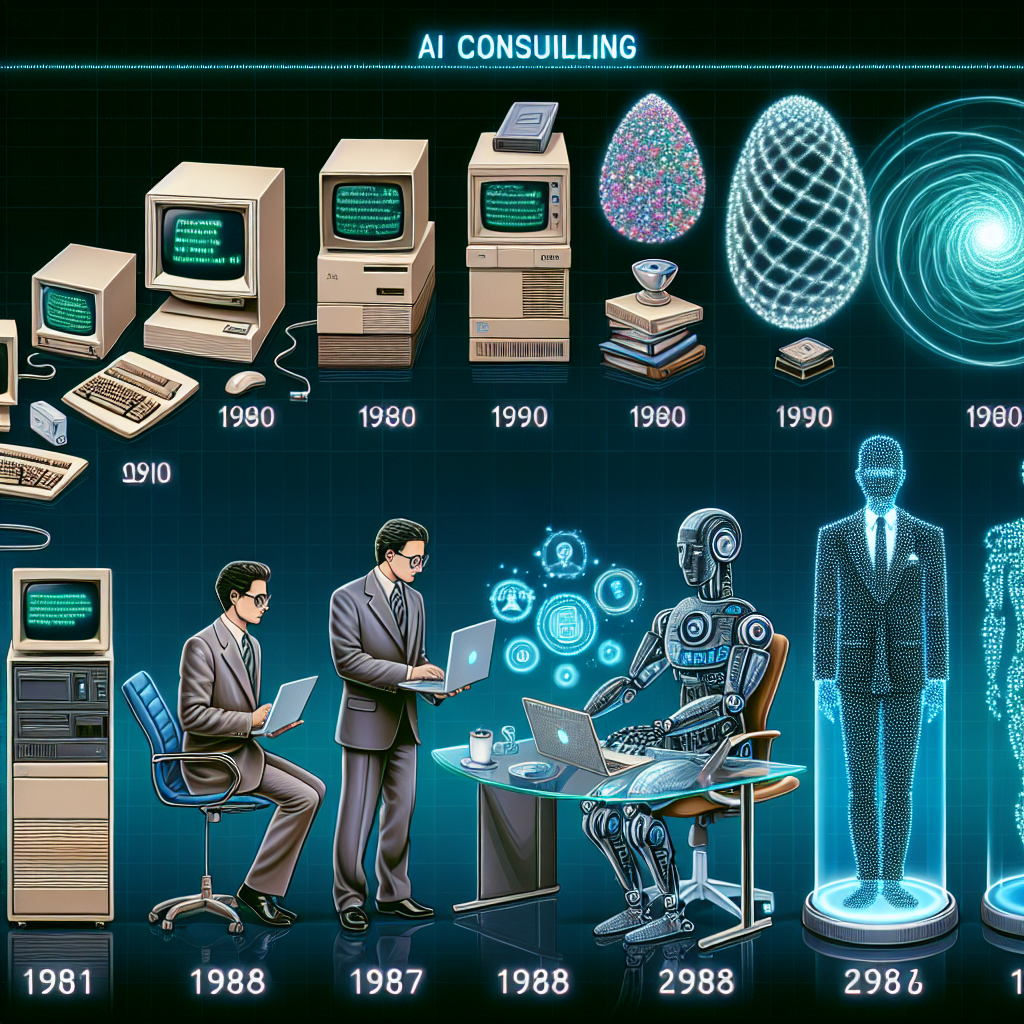The Evolution of AI Consulting
Artificial Intelligence (AI) has rapidly become a crucial tool for businesses looking to gain a competitive edge in today’s digital economy. From predictive analytics to natural language processing, AI technologies are revolutionizing the way companies operate and make decisions. As a result, the demand for AI consulting services has grown exponentially in recent years. In this article, we will explore the evolution of AI consulting and how it has changed over time.
The Early Days of AI Consulting
The concept of AI consulting can be traced back to the early days of artificial intelligence research in the 1950s and 1960s. At that time, AI was still in its infancy, and the technology was largely confined to academic research labs and government agencies. However, as interest in AI grew, businesses began to see the potential for using AI technologies to solve complex problems and drive innovation.
The first wave of AI consulting firms emerged in the 1970s and 1980s, offering specialized services to help companies leverage AI technologies in areas such as pattern recognition, expert systems, and robotics. These early consulting firms were typically staffed by computer scientists, mathematicians, and other technical experts who had deep expertise in AI technologies.
As AI technologies advanced, so too did the scope of AI consulting services. In the 1990s and early 2000s, AI consulting firms began to expand their offerings to include a wider range of AI applications, such as machine learning, data mining, and neural networks. These firms also started to work with a broader range of industries, including finance, healthcare, and retail.
The Rise of Big Data and Machine Learning
In recent years, the explosion of big data and the development of sophisticated machine learning algorithms have further transformed the AI consulting landscape. As businesses collect and analyze ever-increasing amounts of data, the need for AI consulting services has never been greater. AI consulting firms are now helping companies harness the power of big data and machine learning to drive business growth and innovation.
Today, AI consulting services encompass a wide range of capabilities, including data analytics, predictive modeling, natural language processing, and image recognition. These services are being used by companies in a variety of industries to improve customer experiences, optimize operations, and drive revenue growth.
AI consulting firms are also helping businesses navigate the complex ethical and regulatory issues surrounding AI technologies. As AI becomes more integrated into everyday life, companies need to ensure that their AI systems are fair, transparent, and accountable. AI consulting firms are providing expertise in areas such as bias detection, privacy protection, and regulatory compliance to help companies build ethical and responsible AI systems.
The Future of AI Consulting
Looking ahead, the future of AI consulting is likely to be shaped by emerging technologies such as deep learning, reinforcement learning, and quantum computing. These technologies have the potential to revolutionize the way AI systems are developed and deployed, opening up new opportunities for businesses to leverage AI in innovative ways.
AI consulting firms will need to stay ahead of these trends by investing in research and development, hiring top talent, and forging partnerships with technology vendors. Companies that can effectively harness the power of AI technologies will have a significant competitive advantage in the marketplace.
FAQs:
1. What is AI consulting?
AI consulting involves providing expert advice and services to help businesses leverage artificial intelligence technologies to solve complex problems and drive innovation. AI consulting firms typically work with companies to develop AI strategies, build AI systems, and optimize AI applications.
2. What are some common AI consulting services?
Some common AI consulting services include data analytics, predictive modeling, natural language processing, image recognition, and robotics. AI consulting firms also provide expertise in areas such as bias detection, privacy protection, and regulatory compliance.
3. How can AI consulting help my business?
AI consulting can help your business in a variety of ways, including improving customer experiences, optimizing operations, and driving revenue growth. By working with an AI consulting firm, you can harness the power of AI technologies to gain a competitive edge in the marketplace.
4. What industries can benefit from AI consulting?
AI consulting services are being used by companies in a wide range of industries, including finance, healthcare, retail, manufacturing, and technology. Any business that collects and analyzes data can benefit from AI consulting services to drive business growth and innovation.
5. How can I choose the right AI consulting firm for my business?
When choosing an AI consulting firm, it’s important to consider factors such as the firm’s expertise, experience, and track record in delivering AI solutions. You should also look for a firm that has a deep understanding of your industry and can provide customized solutions to meet your specific needs.
In conclusion, the evolution of AI consulting has been driven by advancements in AI technologies, the rise of big data, and the growing demand for AI expertise in the marketplace. AI consulting firms play a crucial role in helping businesses leverage AI technologies to drive innovation, improve customer experiences, and gain a competitive edge. As AI technologies continue to evolve, AI consulting firms will need to stay ahead of the curve by investing in research and development, hiring top talent, and forging partnerships with technology vendors. By working with an AI consulting firm, businesses can unlock the full potential of AI technologies and drive business growth in the digital economy.

